| |
Featured Project | REACH by Reachmydream.org [Master's Thesis for SDM prgram] |
||
REACH DESCRIPTION REACH is an unprecendented experimental tool, which was created to help high school students to realize the "value" of knowledge concepts taught in high school level and to help them strategically create their own personal learning plans based on their career interests. The tool is primarily designed in a way that helps increase students' motivation to learn and helps cultivate a mindset of self-directed learning. Based on the research, student's freedom to choose what concept to learn (autonomy), student's confidence of achieving the desired concept (competence) and the significance of student's selected choices (purpose) are three phychological components that can promote motivation to learn. For that findings, REACH uses a role in societies as a targeted learning goal while using the relevant skills as desired competence for accomplishing the self-selected learning goal. By visualizing the subtle connections among professions, assorted skills and relevant knowledge concepts, REACH not only promotes the students' motivation to learn but also empowers high school students to discover the paths to their dreams.
PROJECT OBJECTIVE The main project objective is to design and develop a conceptual system that is able to intrinsically motivate students to learn. REACH is an exemplary tangible prototype where the software implementation follows the system design principles, which are constructed based on a number of interdisciplinary researches from System Engineering to Educational Psychology.
PROJECT STATUS Since June 2010, REACH has been made available on the website reachmydream.org to allow students to play and interact with. Students' experience with REACH as well as their opinions are collected to analyze the tool effectiveness as well as validating the practicality of the designed conceptual system. In September 2010, this tool was publicly introduced for the first time to nearly 700 students in a high school in Thailand while there are other 1,500 students invited to play with the system in January 2011. The purpose was to collect substantial data to ensure the system capabilities in motivating students to learn.
PROJECT MOTIVATION Students in many countries tend to lose their focus, attention and even interests in academic classes when they are unable to envision possible real-world applications of the knowledge concepts, appreciate the values of the knowledge concepts, and recognize the subtle connections among those knowledge concepts that can be actually linked to derive an advance knowledge concept or develop innovative ideas around them.
I strongly believe that the awareness of each knowledge concept value and the connection among of the knowledge concept can captivate the students' focus, attention and interest. For that reason, one possible initiative in improving current education systems is to explore whether or not the concept of "Awareness of the Value of Knowledge System" is a complementary piece that can be seamlessly incorporated into existing learning system architectures around the world. Perhaps, this missing piece could raise students' interest in learning, and eventually drive the students to be highly self-motivated and eager to learn at their maximum potential.
PROJECT IMPLEMENTATION To maximize user interactive experience, I use Adobe Flash technology to develop REACH. With ActionScript 3 and Papervision3D engine, the tool allow students to visualize all the professions, skills and knowledge concepts as well as their connections in 3D space, leading to more engaging experience.
PROJECT CONTRIBUTION This is a solo research project.
PROJECT CREDITS Pat Hale - Thesis Advisor Prof. Mitchel Resnick - Thesis Committee
PROJECT ARTIFACTS |
|
|
REACH Introductory Video |
||
|
|
||
REACH Advanced Tutorial |
||
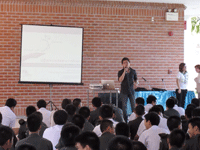 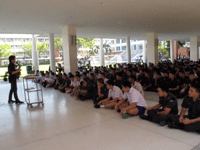 |
||
Tool Introduction Session at Assumption College Thonburi | Sep 22, 2010 |
||
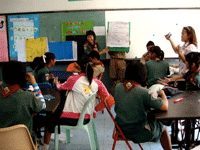
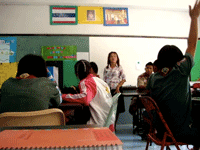 |
||
Understanding students through class observations in rural school | 2009 |
||
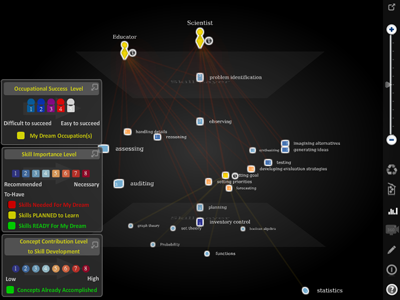 |
||
Exploring dream profession by using REACH |
||